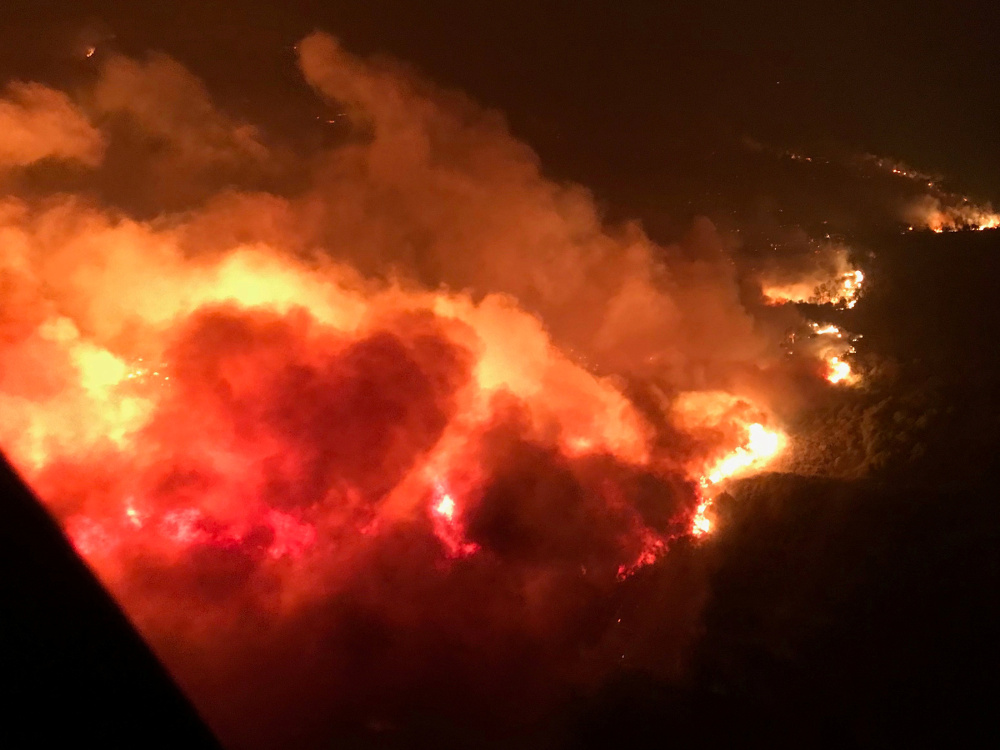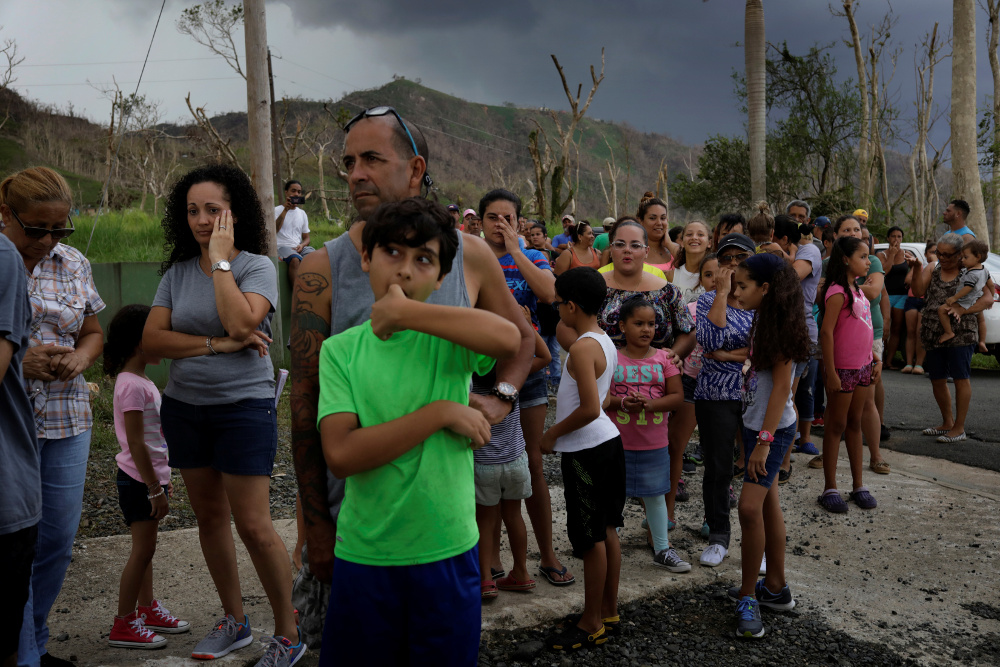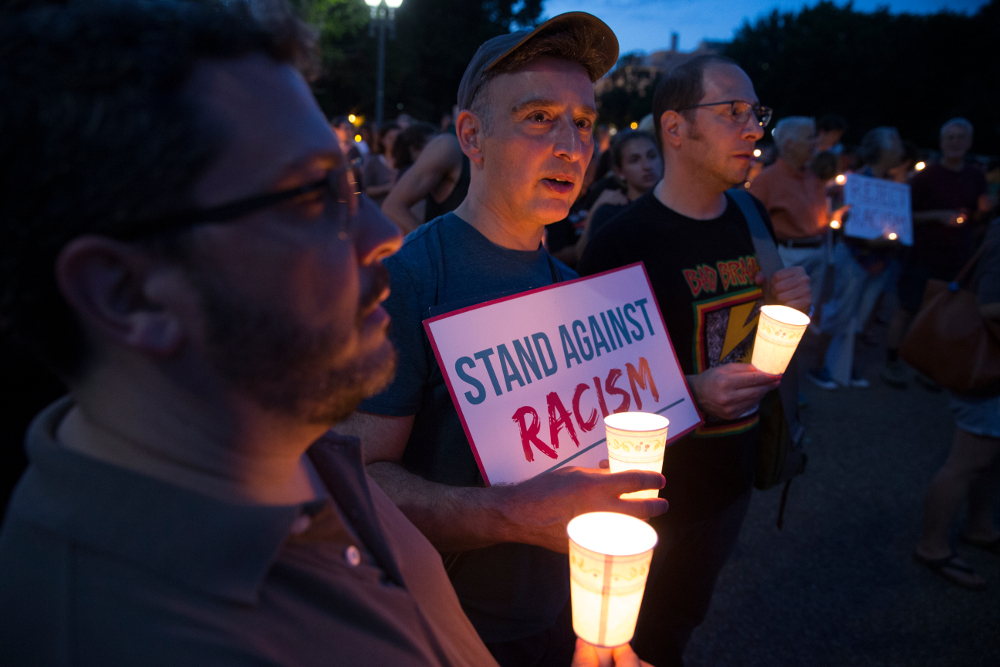
A wildfire is seen near Atlas Road in Napa, California, Oct. 9. (CNS/Reuters/California Highway Patrol)
My usual wake-up routine is to open my eyes and whisper, "Hi, God." Then I lie there, rubbing the sleep from my eyes, and send out prayers for folks I am aware are in need of some extra help today.
I don't know about you, but these days, I don't know who to pick. Cataclysmic events — both natural and political — are occurring so hard and fast, it is difficult to remember for whom to pray.
As I type, Northern California is on fire. Before that, Puerto Rico was demolished by Hurricane Maria. Before that, Florida was bracing for Hurricane Irma after that storm had already decimated Cuba and other islands in the Caribbean. In between those were massive earthquakes in Mexico. Before that, Houston and much of the South were underwater because of Hurricane Harvey. And before that, our own Pacific Northwest was ablaze. Wildfires in Washington, Oregon, Montana and up in British Columbia raged untamed for weeks.
Countless lives have been changed forever. Those who didn't die lost beloved family members and friends, pets, livestock, property, their homes and businesses and livelihoods. Children lost their schools and the comforts of home and routine. Parents lost their ability to care for their families. Right now, all around the Earth, people need the basics of life — food, water, shelter, power, sanitation, medical care — and are simply not able to obtain them.

Residents wait for soldiers in helicopters to deliver food and water Oct. 13 during recovery efforts following Hurricane Maria in San Lorenzo, Puerto Rico. (CNS/Reuters/Lucas Jackson)
Advertisement
In terms of prayer or more tangible ways to help, I barely know where to start.
It seems to have occurred to many that Mother Earth is angry. She is shaking us off her great back like an irritated animal dislodging its rider because of our generally poor stewardship of her resources.
While there may be some truth in that — as our species has wantonly polluted this planet, allowed global warming, and in general treated our only home as disposable for eons — the greater truth is that in the midst of our busy lives, it is easy to forget that all of us dwell on a violent, ever-changing Earth.
We pretend we own things — our homes, our cars, our places of business — but in actuality, we simply rent space between poles of ice on a thin crust covering an orb of intensely hot and unstable magma.
Like ants chasing crumbs of birthday cake on a party balloon, in our focus to survive, we assume stability where there is only fragility. The only constant on our evolving planet is change.
Until natural calamities shake us awake, reminding us that the only actual control or choice we have is to take care of one another.
Sobering, right? Terrifying? Yep! Just too much to think about every second of every day. I know. I guess that is why, in general, we don't. Until natural calamities shake us awake, reminding us that the only actual control or choice we have is to take care of one another.
Adding to these reminders of our true vulnerability, the response to these calamities from our country's current administration, embodied by our president, has been polarizing in the extreme.
Where our leader could and should be inspiring us to greater unity and caring for each other, instead we see daily examples of bigotry, hatred and violence emboldened by President Donald Trump's words, actions, and inactions. Again, sobering stuff. And yes, terrifying.
Much like I blissfully pretend that the earth beneath my feet is solid, I did not want to believe that Americans still had so much hate in them. I chose to believe that since we had elected an African-American president in the previous two elections, we had come a long way since the division of the 1960s and the history of separation and subjugation that preceded that time of change.
The difference in Trump's allegiance to aiding hurricane victims in Texas and Florida compared with how he has insulted and threatened our citizens in Puerto Rico has been startling. It seems to me that the only difference between those U.S. citizens is their color and language. The loyalty and assistance extended to them have been starkly different.
And it makes my head reel and heart ache to hear Trump describe Ku Klux Klan members who participated in the lethal rally in Charlottesville, Virginia, as "fine people" but deride NFL players who take a knee or stay in the locker room during the opening anthem in peaceful protest against racial violence as "sons of bitches."
The waves that emanate from these biased comments and actions seem to act as an affirmation for racist Americans that they are correct in their own beliefs. If our president treats people of other races and ethnicities with such disdain, why shouldn't they?
What we don't need in this time of global tension and tragedy is to be more divided.

People participate in a candlelight vigil Aug. 13 outside the White House to show solidarity with the victims of violence that took place at a white nationalist rally in Charlottesville, Virginia. (CNS/EPA/Michael Reynolds)
I cling to the hope that this is a temporary period of polarity. That the recent revealing of the dark underbelly of bigotry in America has been tragic, but somehow necessary. Like the lava that bubbles not that far beneath us, it was always there, just ignored by many of us.
If natural disasters can remind us that our life on this earth is a temporary and fragile gift — and that we can and should focus long-term more on loving each other and sharing resources than on short-termed nationalism and greed — I am hopeful that peeling the scabs from the wounds of racial inequity will ultimately lead to healing.
So, this morning, as I start another day, I find myself praying: God, please show me what I can do to help today. To help folks who are suffering. To help our hearts heal. In the meantime, God, please help everybody.
[Amy Morris-Young graduated from and taught writing at Loyola Marymount University in Los Angeles.]







